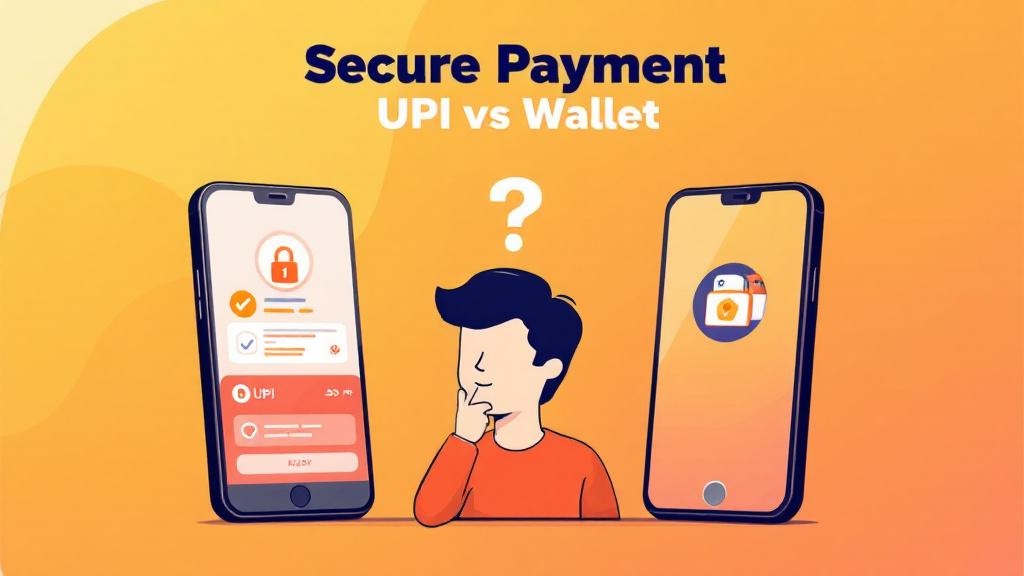Online shopping has become a cornerstone of the modern shopping experience, with millions of people using various digital payment methods every day. With this surge in digital transactions, questions around payment security have become more pressing than ever. Two of the most widely used methods for online payments in India are UPI (Unified Payments Interface) and digital wallets.
When making payments for goods and services online, consumers are rightfully concerned about the safety of their financial information. With so many options available, it can be difficult to determine which payment method—UPI or digital wallets—offers the best security. In this blog post, we will compare the security features of both UPI and digital wallets to help you make an informed decision for safer online shopping.
What Is UPI and How Secure Is It?
What Is UPI?
UPI (Unified Payments Interface) is a real-time payment system that allows instant money transfers between bank accounts using mobile phones. Developed by the National Payments Corporation of India (NPCI), UPI has revolutionized the way people transfer money in India, providing a secure and convenient way to make payments for everything from utility bills to shopping online.
UPI Security Features
UPI payments have several built-in security features, designed to ensure safe transactions. These include:
-
Two-Factor Authentication (2FA): UPI transactions require two-factor authentication, adding an extra layer of security. You must enter your UPI PIN for each transaction, which is known only to you.
-
Encryption: All data shared during UPI transactions is encrypted, ensuring that sensitive information remains protected from potential cyber threats.
-
One-Time Password (OTP): For additional protection, UPI sends an OTP to your registered mobile number to verify each transaction.
-
Real-Time Payment System: UPI operates in real-time, which means payments are processed instantly, minimizing the window for fraud to occur.
Is UPI Secure for Online Shopping?
When it comes to secure payments, UPI is one of the safest methods. The use of encryption, two-factor authentication, and OTPs ensures that your personal and financial details remain protected during online shopping. Additionally, UPI transactions are directly linked to your bank account, providing another layer of security as they don’t rely on third-party intermediaries like some digital wallets do.
What Is a Digital Wallet and How Secure Is It?
What Is a Digital Wallet?
A digital wallet (or e-wallet) is a mobile app or software that stores payment information, such as credit/debit card details, digital cash, or loyalty cards, for easy transactions. Popular digital wallets in India include Paytm, PhonePe, Google Pay, and Amazon Pay. These wallets allow users to make both online and offline payments quickly.
Digital Wallet Security Features
Digital wallets also prioritize security but differ from UPI in the way they store and manage payment information. Some of the security features of digital wallets include:
-
Two-Factor Authentication (2FA): Like UPI, digital wallets also employ 2FA to verify each transaction. You may need to enter a PIN or use biometric authentication (fingerprint or face recognition) for added security.
-
Data Encryption: Wallet apps use strong encryption to protect your sensitive financial data. Any data shared during transactions is encoded to prevent interception by hackers.
-
Transaction Limits: Most digital wallets set transaction limits to minimize potential losses in case of fraud. These limits can usually be adjusted according to the user’s preferences.
-
Secure Payment Gateways: Digital wallets generally work with secure payment gateways to facilitate transactions. These gateways are designed to handle payment data safely and comply with industry security standards.
Is a Digital Wallet Secure for Online Shopping?
Digital wallets offer strong security, with encryption and two-factor authentication. However, the level of security may depend on the specific app you are using and how well it follows security protocols. Some wallets store sensitive information on their servers, which could become a potential point of vulnerability in case of a breach.
UPI vs Wallet: Which Is Safer for Online Shopping?
Now that we understand the security features of both UPI and digital wallets, let’s compare them in the context of online shopping.
UPI Secure Payment Methods
-
Direct Bank Integration: Since UPI is linked directly to your bank account, transactions are processed without the need for third-party intermediaries. This eliminates the possibility of your financial information being stored or mishandled by external services, which can occur with digital wallets.
-
Instant Transaction Verification: UPI ensures that each transaction is verified in real-time, reducing the chances of fraud. Additionally, UPI’s two-factor authentication adds an extra layer of security for online payments.
-
RBI Guidelines for Digital Payments: UPI transactions follow the regulatory guidelines set by the Reserve Bank of India (RBI), which ensures that they meet the highest standards of security and customer protection.
Mobile Wallet Safety Comparison
-
Centralized Data Storage: One downside of digital wallets is that they store your payment information in a centralized location (their servers). While encryption helps protect this data, it still poses a risk if the wallet’s security is compromised.
-
Extra Authentication Layers: Wallet apps often use advanced authentication methods like fingerprint scanning, Face ID, and PINs, which can add layers of security beyond traditional UPI methods. However, the effectiveness of these measures can vary depending on the app’s security protocols.
-
Payment Gateway Integration: Digital wallets are connected to secure payment gateways, ensuring that transaction data is safely transmitted between the wallet app and the retailer’s system. However, third-party gateways always introduce a slight risk of security breaches.
UPI vs Digital Wallets: Pros and Cons for Online Shopping
| Feature | UPI | Digital Wallet |
|---|---|---|
| Data Storage | Data is not stored by UPI (direct bank-to-bank transfer) | Payment information stored in the wallet app |
| Two-Factor Authentication | Required for every transaction (PIN) | Required for every transaction (PIN, biometrics) |
| Transaction Speed | Instant, real-time transaction | Instant, but can depend on wallet app integration |
| Transaction Limits | Limits set by the bank, typically higher | Often have lower limits, adjustable in settings |
| Security Breaches | Fewer risk points (no intermediary) | Possible risk points (centralized data storage) |
| Compliance with Regulations | Fully regulated under RBI guidelines | Complies with financial regulations but varies by app |
Best Payment Method for Online Shopping in India: UPI vs Wallet
Why UPI is the Best for Secure Payments
For those prioritizing transaction security when shopping online, UPI generally offers a more secure option due to the lack of intermediaries and the direct integration with your bank account. With UPI, your data is less likely to be stored in centralized servers, which reduces the risk of a data breach. Additionally, UPI’s real-time verification and regulatory compliance make it one of the safest methods for online transactions.
Why a Digital Wallet Can Be a Good Option
Digital wallets provide added convenience, especially if you frequently shop online and prefer to store payment methods for quick access. The security features like fingerprint authentication and encryption help safeguard your data. However, ensure that the wallet you are using adheres to best practices for data encryption in fintech and has a robust payment gateway system.
FAQs on UPI vs Wallet Security for Online Shopping
1. Is UPI more secure than a mobile wallet?
Yes, UPI is generally more secure as it involves direct transactions between banks, reducing the chance of data being stored on third-party servers.
2. What is the safest digital payment method in India?
Both UPI and digital wallets offer secure payment methods. However, UPI tends to be safer due to its direct bank-to-bank transactions and RBI compliance.
3. Can UPI be hacked during online shopping?
While no system is 100% hack-proof, UPI’s two-factor authentication and real-time transaction verification make it highly secure.
4. Are digital wallets safe for online payments?
Digital wallets are secure, especially when they use encryption, PINs, and biometrics. However, the risk increases if the wallet’s security protocols are not up to date.
5. What should I do if I suspect fraud in a UPI transaction?
Immediately report the incident to your bank and the app provider. UPI transactions are often reversible if caught early.
Conclusion: Secure Payment UPI vs Wallet
Both UPI and digital wallets offer secure payment methods for online shopping, but they come with different advantages and risks. UPI is typically the safer option due to its direct bank-to-bank transactions and enhanced security features like two-factor authentication and encryption. Digital wallets, while offering great convenience and advanced authentication methods, carry a slightly higher risk due to centralized data storage.
Ultimately, the best payment method depends on your priorities—if security is your main concern, UPI is the way to go. If you value convenience and don’t mind the added risk, a digital wallet could be your best bet. Always ensure that whichever option you choose, the app or platform adheres to RBI guidelines for digital payments and employs the latest security measures to protect your data.








Comments (0)